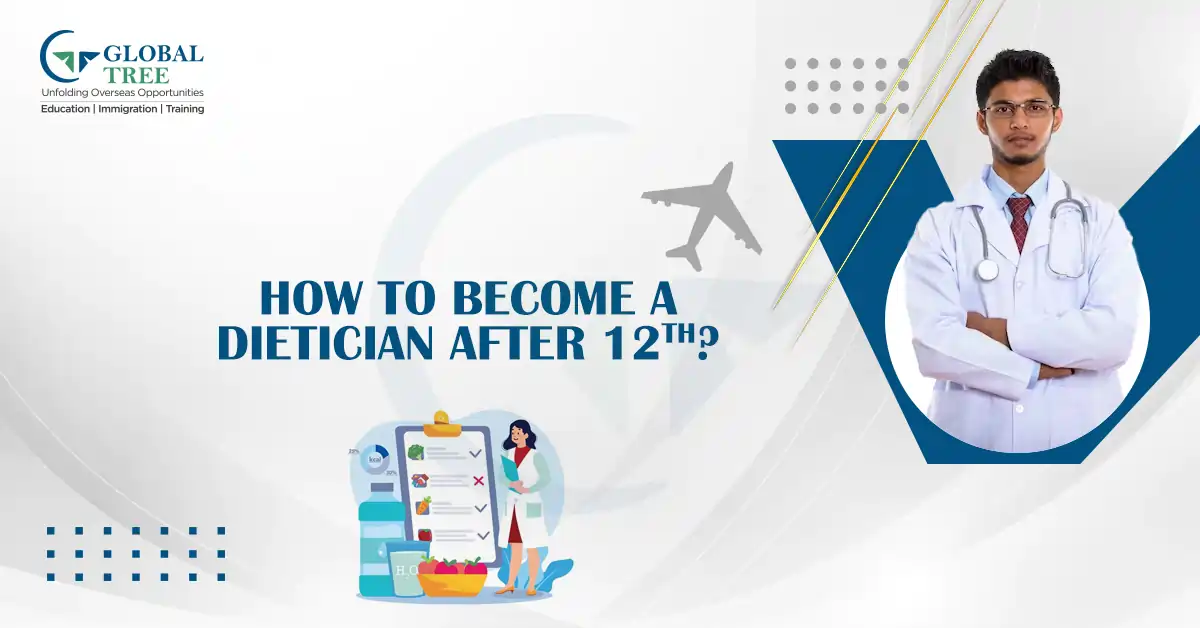How to Become a Dietician after 12th? Courses, Eligibility & Scope

- Introduction
- Who is a Dietician?
- What are the Skill Requirements for Dietician Courses After 12th?
- Pick the Right Stream in 12th Grade
- What are the Entrance test required for Dietician course after 12th Abroad?
- Undergraduate Programs for Nutrition and Dietetics
- Masters programs to Study Nutrition and Dietetics:
- Diploma Dietician Courses after 12th: Nurturing Aspiring Dieticians
- Eligibility Criteria for Diploma Dietician Courses after 12th
- Jobs after Completing Dietician Courses Abroad
- Dietetic Internship: Bridging Theory and Practice
- Staying Fresh in the Field: Continuous Learning
- Dietitians Registration Exam
- Finally: Recipe for Success
- FAQS - Frequently Asked Questions
Introduction
Are you a 12th grader pondering over your career choices, with a love for all things food-related?
Well, buckle up, because we're about to serve relevant information on how to become a dietician after 12th in India.
Who is a Dietician?
Let's start with the basics. A dietician is not a magician who makes your favourite snacks disappear; instead, they're the superheroes of the nutrition world.
They help people make healthy lifestyle choices by crafting personalized diet plans, guiding them through the maze of food labels, and generally being the nutritional gurus we all need.
What are the Skill Requirements for Dietician Courses After 12th?
Strong Scientific Foundation:
A grasp of biology and chemistry forms the bedrock for understanding nutritional principles and their impact on the human body.
(Read More: Should you opt a career in Nutraceuticals for work abroad?)
Communication Skills:
Dieticians need to convey complex nutritional information in an accessible way, making effective communication a critical skill.
Analytical Thinking:
The ability to analyze dietary patterns, assess nutritional needs, and create tailored plans requires sharp analytical thinking.
Empathy:
Understanding and connecting with individuals to address their unique nutritional needs is facilitated through empathy.
Pick the Right Stream in 12th Grade
Before diving into studying dietetics course abroad, you need to make sure you're swimming in the right stream.
Opt for science, specifically focusing on Biology, in your 11th and 12th grades.
What are the Entrance test required for Dietician course after 12th Abroad?
Research the location and type of University you wish to apply to.
If you want to study your bachelor’s abroad you may need to take standardized tests or fulfill specific admission requirements
Here are some general guidelines for a few popular study destinations:
1. United States: SAT or ACT
For undergraduate admissions in the United States, many universities require either the SAT or ACT. These are standardized tests that assess a student's readiness for college.
2. United Kingdom: UCAS and A-Levels
In the UK, you typically apply through the Universities and Colleges Admissions Service (UCAS). A-Levels (Advanced Level qualifications) or equivalent international qualifications are often required for admission to bachelor's programs.
3. Australia: ATAR or Equivalent
In Australia, the Australian Tertiary Admission Rank (ATAR) is commonly used for undergraduate admissions. However, requirements can vary by institution.
4. Canada: High School Diploma and Additional Requirements
Canadian universities often require a high school diploma or equivalent for undergraduate admissions. Some institutions may have additional requirements, such as specific courses in science or mathematics.
5. European Countries: Country-Specific Requirements
For countries in Europe, admission requirements can vary widely. Some universities may require standardized tests, while others may assess applicants based on their high school grades or equivalent qualifications. Research the specific requirements of the universities you're considering.
Note: Specific requirements for nutrition or dietetics programs may vary between universities. Therefore reach out to us for more Information!
(Read More: Check your eligibility for Allied Health Sciences Course)
6. Language Proficiency Tests: IELTS or TOEFL
Regardless of the country you choose, if English is not your first language, you may be required to demonstrate proficiency in English through tests like the IELTS (International English Language Testing System) or TOEFL (Test of English as a Foreign Language).
Before applying to any university, it's crucial to check the specific admission requirements for the nutrition or dietetics program you're interested in.
Each university may have its own set of prerequisites, and meeting these requirements will increase your chances of securing admission to your desired program.
Additionally, consider reaching out to the university's admission office for detailed information and guidance. We can help you by cutting down this process with the help of our counselors.
Undergraduate Programs for Nutrition and Dietetics
Now that you've aced the entrance exams, it's decision time.
There are various undergraduate programs to choose from, like B.Sc. Nutrition and Dietetics, B.Sc. Food Science, or B.Sc. Clinical Nutrition.
Pick the one that aligns with your passion for promoting healthy eating habits.
1. B.Sc. Nutrition and Dietetics:
Start your dietitian journey by enrolling in a Bachelor of Science (B.Sc.) program in Nutrition and Dietetics.
This undergraduate course provides a comprehensive understanding of food science, nutrition principles, and the art of creating personalized diet plans.
2. B.Sc. Food Science: The Culinary Side
For those who are not just passionate about nutrition but also intrigued by the science behind food, a B.Sc. in Food Science is a delectable choice.
This stream combines the study of food technology, microbiology, and nutrition, offering a broader perspective on the food industry.
3. B.Sc. Clinical Nutrition: Healing Through Nutrition
If you aspire to work in healthcare settings, a B.Sc. in Clinical Nutrition might be your calling.
This specialized program focuses on the application of nutrition in clinical settings, preparing you to work alongside healthcare professionals in hospitals or clinics.
4. B.H.Sc. Home Science: The Holistic Approach
For a well-rounded education in nutrition and related fields, consider pursuing a Bachelor of Home Science (B.H.Sc.) with a specialization in Food and Nutrition. This stream encompasses various aspects of home management, including nutrition, making it an excellent choice for a holistic approach to dietetics.
Internships - More than Just Coffee Runs
Internships are your golden ticket to the real world. Gets hands-on experience working with dieticians in hospitals, clinics, or even in the food industry. It's not just about making coffee runs; it's about observing, learning, and maybe an opportunity to put your expertise to the test.
Masters programs to Study Nutrition and Dietetics:
Consider pursuing a master's degree in nutrition or dietetics. It's like unlocking the advanced levels of the nutrition game.
Pursuing a master's degree in Nutrition or Dietetics allows for specialization in areas such as sports nutrition, public health nutrition, or clinical dietetics.
(Read More: A list of hardest degrees to pursue across various universities)
Here are some common master's degrees that can lead to a career as a dietician:
1. Master of Science in Nutrition:
This program typically provides an in-depth study of advanced nutrition concepts, research methods, and clinical applications. It prepares students for roles in clinical dietetics, public health nutrition, and research.
2. Master of Science in Dietetics:
Focused specifically on dietetics, this program delves into advanced topics such as medical nutrition therapy, community nutrition, and food service management. It often includes a practicum or internship component for hands-on experience.
3. Master of Public Health (MPH) in Nutrition:
Ideal for those interested in public health and community nutrition, an MPH in Nutrition emphasizes population health, epidemiology, and health promotion. Graduates can work in public health agencies, NGOs, or governmental health departments.
4. Master of Clinical Nutrition:
This program is tailored for individuals aiming to specialize in clinical nutrition. It covers advanced topics related to therapeutic nutrition, disease prevention, and medical nutrition therapy.
5. Master of Public Health (MPH) with a Focus on Global Health:
For those interested in addressing nutrition challenges on a global scale, an MPH with a focus on global health provides insights into international nutrition issues, policies, and interventions.
6. Master of Science in Sports Nutrition:
Geared towards individuals interested in the intersection of nutrition and sports, this program covers topics such as sports performance nutrition, exercise physiology, and specialized dietary strategies for athletes.
7. Master of Science in Food Science and Nutrition:
Combining aspects of food science with nutrition, this program explores the science behind food production, safety, and its impact on health. Graduates may find opportunities in food industry research and development.
8. Master of Business Administration (MBA) in Healthcare Management:
For dieticians interested in leadership roles and healthcare management, an MBA with a focus on healthcare management provides the business acumen necessary to navigate the healthcare industry.
9. Master of Science in Wellness and Health Promotion:
This program focuses on wellness strategies, health promotion, and lifestyle interventions. Graduates may work in corporate wellness programs, community health organizations, or private wellness consulting.
10. Master of Science in Human Nutrition and Dietetics:
A program that integrates human nutrition and dietetics, covering a broad spectrum of topics such as nutritional biochemistry, research methods, and advanced clinical applications.
11. Master of Science in Clinical Exercise Physiology:
Suitable for those interested in the intersection of nutrition and exercise, this program explores the physiological effects of exercise and how nutrition contributes to overall health and performance.
12. Master of Science in Community Nutrition:
Focused on addressing nutritional needs within communities, this program emphasizes public health nutrition, community outreach, and intervention strategies to improve overall health.
Before selecting a master's program, it's crucial to assess personal interests, career goals, and the specific requirements of the chosen specialization. Additionally, consider programs that offer practical experiences, internships, or research opportunities to enhance hands-on skills in the chosen area of dietetics.
(Read More: Family and consumer course to study abroad: Know the details)
Diploma Dietician Courses after 12th: Nurturing Aspiring Dieticians
Diploma courses offer a focused and efficient pathway for aspiring dieticians to gain specialized knowledge and practical skills in the field of nutrition and dietetics. If you're eager to dive into the world of dietetics right after completing 12th grade, here's a guide to some notable diploma courses tailored for future dieticians:
Diploma in Dietetics and Applied Nutrition:
This diploma program provides a comprehensive understanding of the principles of dietetics and their practical applications. Students learn to assess nutritional needs, design therapeutic diets, and promote healthy eating habits.
Diploma in Clinical Nutrition:
Focused on the clinical aspects of nutrition, this diploma equips students with the skills needed to work in healthcare settings. It covers topics such as medical nutrition therapy, patient assessment, and dietary management of various health conditions.
Diploma in Sports Nutrition:
Tailored for those interested in the intersection of nutrition and sports, this program delves into the dietary requirements of athletes, exercise physiology, and specialized nutritional strategies to enhance sports performance.
Diploma in Food Science and Nutrition:
This diploma combines the science of food with nutritional principles, offering a broader understanding of the relationship between food and health. Students explore food safety, food production, and the impact of food on human well-being.
(Read More: 5 Top-notch universities across the globe for higher education)
Diploma in Public Health Nutrition:
Geared towards addressing community nutritional needs, this program emphasizes public health nutrition, community outreach, and intervention strategies to improve overall health on a larger scale.
Eligibility Criteria for Diploma Dietician Courses after 12th
The eligibility criteria for diploma courses in dietetics typically include:
- Completion of 12th grade from a recognized board.
- A background in science, particularly biology and chemistry, is often preferred.
- Some institutions may conduct entrance exams or interviews as part of the admission process.
Jobs after Completing Dietician Courses Abroad
Completing a diploma in dietetics opens up various career avenues for aspiring dieticians, including:
Clinical Dietician Assistant:
Work alongside clinical dieticians in hospitals, clinics, or healthcare settings, assisting in patient assessments and dietary management.
Community Nutrition Worker:
Engage in community outreach programs, educating the public on healthy eating habits, and implementing nutrition interventions.
(Read More: Is Australia the best destination to study Medicine?)
Sports Nutrition Assistant:
Support athletes in understanding their nutritional requirements, meal planning, and implementing dietary strategies to enhance sports performance.
Food Quality Assurance Officer:
Contribute to ensuring the safety and quality of food products in industries by applying knowledge in food science and nutrition.
Public Health Nutrition Educator:
Collaborate with public health organizations to educate communities on nutrition, implement health programs, and address public health issues.
Additionally, you can also choose:
- Research and Academia:
Engage in research and academia by pursuing a Ph.D. in Nutrition or a related field. This path is suitable for those interested in contributing to the field through research, teaching, and academic endeavors.
- Public Health and Community Nutrition:
Explore opportunities in public health and community nutrition. Work with government agencies, NGOs, or community organizations to design and implement nutrition programs that address public health issues.
- Entrepreneurship:
Consider entrepreneurship by starting a private practice or consulting business. This allows dietitians to offer personalized nutrition services, workshops, and advice to individuals or organizations.
- Global Health and Nutrition Advocacy:
Engage in global health initiatives or nutrition advocacy. Work with international organizations or NGOs to address nutrition-related challenges on a global scale.
- Media and Communications:
Explore opportunities in media and communications by becoming a nutrition writer, blogger, or spokesperson. Communicate nutrition information through various platforms to educate the public on healthy eating habits.
Choosing the right path after a bachelor's degree depends on individual interests, goals, and the specific requirements of the chosen specialization. Pursuing advanced education, gaining practical experience, and staying updated with industry trends are key elements in building a successful career as a dietitian.
Dietetic Internship: Bridging Theory and Practice
Once you've completed your academic journey, a dietetic internship is the bridge between theoretical knowledge and practical application.
This hands-on experience is crucial for gaining insight into the daily life of a dietitian, honing your skills, and building confidence in your ability to navigate the nutritional landscape.
Staying Fresh in the Field: Continuous Learning
The world of nutrition is ever-evolving, akin to a dynamic recipe that never stays the same.
Engage in continuous learning by attending workshops, seminars, and staying abreast of the latest research in the field. Joining professional organizations and quirky dietitian communities can also add a dash of excitement to your learning journey.
Whether you explore a more culinary or clinical route, the key is to savor every moment of your educational journey and,in the end,
Serve up a plate of health and happiness as a qualified dietitian.
(Read More: A Guide to Study Naturopathy Course Abroad)
Dietitians Registration Exam
You've survived the academic hurdles; now it's time to conquer the registration exam. In India, you'll need to clear the Dietitians Registration Exam conducted by the Indian Dietetic Association (IDA).
Once that's done, you officially earn the title of a Registered Dietitian (RD)!
If you are planning to settle abroad, you may want to:
1. Research Nursing Regulations in Your Target Country:
Each country has its own nursing regulatory body that governs the profession. Research the specific requirements, licensing processes, and any examinations or tests you need to pass to become a registered nurse in the country of your choice.
2. Credential Evaluation:
Some countries may require you to have your educational credentials evaluated to ensure they meet the local standards. This process may involve submitting your academic transcripts and diplomas to a credential evaluation service.
(Read More: Check out the future scope of Paediatrics course abroad)
3. Pass Licensing Examinations:
Most countries require foreign-educated nurses to pass a licensing or registration examination. In the United States, for example, this is the NCLEX-RN (National Council Licensure Examination for Registered Nurses). Other countries will have their own licensing exams.
4. Obtain Necessary Documentation:
Gather all necessary documentation, including proof of education, transcripts, letters of recommendation, and any other documents required by the nursing regulatory body in the country of your choice.
5. Apply for Licensure:
Submit your application for licensure to the nursing regulatory body in the country where you want to practice. Be sure to follow all application procedures, pay any required fees, and provide all requested documentation.
6. Visa and Work Authorization:
Obtain the necessary visa and work authorization to work as a registered nurse in your chosen country. This process may involve providing proof of employment, passing health examinations, and other immigration requirements.
(Read More: Can you pursue Nutrition Course after 10th Grade?)
7. Adapt to Local Healthcare Practices:
Familiarize yourself with the healthcare system, practices, and cultural norms in the country where you'll be working. Adapting to local practices will help you provide effective and culturally sensitive care.
It's important to note that this is a general guide, and the specific steps may vary depending on the destination country.
Always check with an education/abroad consultancy to find out the most accurate and up-to-date information. They will help your processing from the country's embassy or consulate for assistance with the immigration process.
Finally: Recipe for Success
So, there you have it – a recipe for becoming a dietitian after 12th. It's a journey filled with science, practical experience, and a sprinkle of passion for food and fitness.
Follow these steps, and you'll be sizzling in the world of nutrition in no time. Remember, it's not just about eating your greens; it's about helping others eat theirs too.
(Read More: Aspiring to become a Nurse? Check this Guide!)
FAQS - Frequently Asked Questions
Is being a dietitian worth it in India?
Nutrition can be a profitable work avenue domain for trained nutritionists, based on their particular area of competence, experience, and educational qualification. Nutritionists are excellent communicators who build long-term relationships with their clients.
What is the Salary of a Dietician in India?
Dietitians in India earn an average monthly salary of 59,280. In India, the average additional cash remuneration for a Dietitian is 35,414, with a range of 11,803 - 91,443.
What is the Salary of a Dietician Abroad?
The average salary of a Dietitian abroad ranges between $44,000-$74,000*
Which Country is Best for Dietitians?
The United States: The United States contains some of the world's greatest nutrition universities, so if you want to study nutrition at a top university, the United States is a fantastic alternative. Educatly can connect you to over 135 nutrition and dietetics schools and degrees in the United States.
Can Dieticians Work Internationally?
To work as a dietician abroad, you may need to go through a skills recognition process. Skills recognition ensures that your qualifications and experience match a country's standards.
A visa or work permit may also be required. A mutual recognition agreement streamlines the process of evaluating your credentials.









